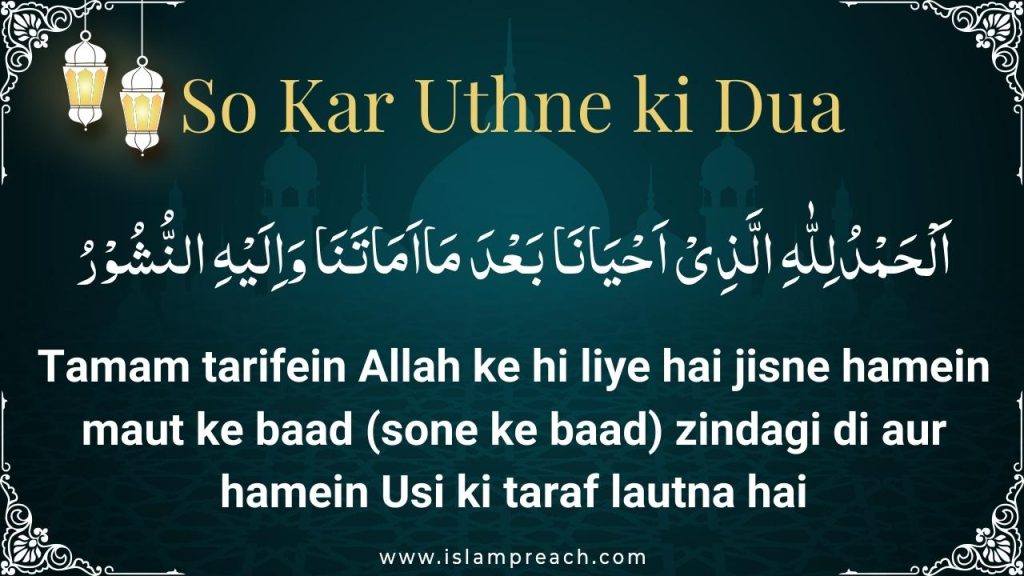Therefore, So Kar Uthne Ki Dua, or Prayer on Waking Up from Sleep, is a promise to oneself that good actions with good intentions are going to be done. It reminds an individual in a soft, positive manner in the morning of this commitment. One is connected to Allah Subhanahu Wa Ta’ala in reciting this prayer, inviting barakah into one’s day. Indeed, it is believed that reciting the Dua When Waking Up From Sleep is an endless blessing. Moreover, this set of Masnoon Duain is also part of Islam..

Instead, listening to the recitation of such supplications, as So Kar Uthne Ki Dua, keeps the blessings of Allah nearer. Though a lot of people memorize these Masnoon Duain, the understanding of their meanings enhances the spirit, particularly for non-Arab Muslims. You can find English and Urdu translations of Dua When Waking Up From Sleep, including So Kar Uthne Ki Dua, at UrduPoint. Moreover, it also provides the proper Arabic pronunciation for those who want to learn it in the original language.
Though it is not obligatory to recite the Masnoon Duain while doing everyday activities, the way of reciting So Kar Uthne Ki Dua shows the sincerity with which one is conducting their activities. If such few words can be remembered, the person receives a reward from Allah SWT for its recitation.
The translation of the Dua reads as:
So Kar Uthne Ki Dua in Arabic: الْحَمْدُ لِلَّهِ الَّذِي أَحْيَانَا بَعْدَ مَا أَمَاتَنَا وَإِلَيْهِ النُّشُورٍ
So Kar Uthne Ki Dua in English: “Alhamdu’lillahillaji’ ahyana ‘baada’ ma’ amatana and ilaihinnushur.”
Translation (Meaning) of So Kar Uthne Ki Dua
All praise is for Allah, who has given us life after causing us to die and to Him is the resurrection.”
Dua when waking up from sleep can also be spiritually referred to as “So Kar Uthne Ki Dua” in its respective terminology. This is a kind of thankfulness and acknowledgement to Allah for this life after a certain time of sleep. Here is the translation and meaning of the dua in English.
Dua Upon Waking Up:
Arabic: “Alhamdu’lillahillaji’ ahyana ‘baada’ ma’ amatana and ilaihinnushur”
English Translation: “All praise is for Allah, who has given us life after causing us to die and to Him is the resurrection.”
Dua for Body and Soul:
Arabic: “Alhamdu’lillahillaji’ aafani fi jasdi’ warda alayaa ruhi’ wa ajina li bijikarihi”
English Translation: “All praise is for Allah, who has granted me well-being in my body and returned my soul to me, and permitted me to remember Him.”
Prayer in the Middle of the Night:
Arabic: “Lā ilāha illallāhu waḥdahu lā sharīka lahu, lahu-l-mulku wa lahu-l-ḥamdu, wa huwa ‘alā kulli shay’in qadīr, subhānallāhi, walhamdu lillāhi, wa lā ilāha illallāhu, wallāhu akbar wa lā hawla wa lā quwwata illā billāhil ‘alīyil ‘aẓīm.”
English Translation: “There is no god but Allah, alone without any partner. His is the kingdom, and for Him is all praise, and He has power over everything. Glory is to Allah, all praise is to Allah, there is no god but Allah, and Allah is the Greatest. There is no power nor might except through Allah, the Most High, the Most Great.”
These supplications are expressions of gratitude, seeking protection, and acknowledging the oneness and greatness of Allah. It’s common for Muslims to recite these prayers as part of their daily routine, reinforcing their connection with the divine.

AoA, my name is Abd al-Rahman, and my vision is to spread the knowledge of the Quran to everyone. I am proud and tall while standing as your trusted mentor on the journey of learning and memorizing the Holy Quran. I, along with a committed team of Islamic teachers, am bound to provide an easy online facility for Islamic studies and Hifz programs.

